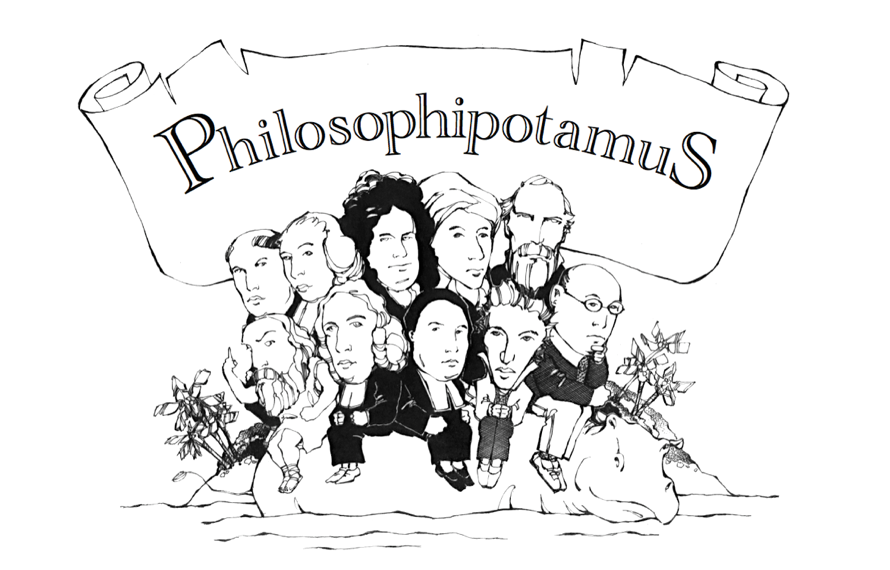A Word from the Editor, Mark Coppenger
After receiving the Ph.D. in philosophy at Vanderbilt, I’ve taught philosophy, whether adjunct or full-time, at Vanderbilt, Wheaton, Midwestern Baptist Theological Seminary, Elmhurst, Trinity (IL), and now Southern Baptist Theological Seminary. Though I’ve spent much of the last three decades in church and denominational work, I’ve waded, splashed, and swum in the river of philosophy right along.
The name, ‘Philosophipotamus,’ is built on the Greek words for river (‘potamus,’ as in ‘hippopotamus’/”river horse,” and ‘Mesopotamia’/”between the rivers”) and the love of wisdom (‘philia’ + ‘sophia’ = “philosophy”), and is roughly translated, “River of Philosophy.” It carries my observations, reflections, and philosophications and those of others in my circle of philosophizing friends and colleagues.
The philosophers pictured on the hippo, most of them Christian, represent my perspectival and stylistic druthers. I could have chosen an additional ten, but even hippos have their load bearing limits. (I’ve used departed souls to skirt the diplomatic challenge of not offending the living.) I’ll talk more about the choices down in the blog, but if pressed to give an off-the-cuff account of my selections, let me start with these notes, left to right, front to back:
Socrates was a dogged, daring, dialogical truth-pursuer, setting the table for a great range of philosophical inquiry with his “What is it?” questions.
Joseph Butler was a “bi-vocational pastor,” as was I, who found time to bishop and to draw thoughtful distinctions in ethics, as in his sermon/essay, “Upon Resentment.”
George Berkeley was another ministerial philosopher who pressed the worthy empirical imperatives, “Cash it in!” and “Don’t talk nonsense!”
Soren Kierkegaard insisted and demonstrated that religion and philosophy were not academic games but enterprises which went to the gut and put you on the spot in the most crucial ways.
C.S. Lewis was a cornucopia of Christian insight and apologetics, with a powerful and engaging style sorely absent in most philosophical discourse.
Thomas Aquinas, though not an evangelical, had much to teach us evangelicals about appropriating truth wherever we find it, about admiring the created order, and about wading into whatever topics might intrigue and confront the church and culture.
Blaise Pascal was an eloquent and winsome vessel of life-important inquiry.
Gottfried Wilhelm Leibniz did big, bold, brilliant, and faithful metaphysical thinking, whatever the snarky Voltaire (with his Candide/Pangloss dig) thought.
Thomas Reid was a devotee of God-engineered common sense, typically in short supply in professional philosophy.
William James wrote sublimely, crisply, and accessibly, and with an admirable pragmatic agenda, inviting us philosophers to take seriously the questions, “Who cares?” and “What does it matter?”
I think of the German ‘Zettel,’ the word assigned to a posthumous collection of Ludwig Wittgenstein’s remarks on a range of topics. That’s what this will be – observations short and long, spontaneous and studied, earthly and heavenly. I’ll group them under “Maps,” “Cases,” and “Miscellany.” I hope you’ll find much that is useful here.

I was pretty pleased to find this site. I wanted to thank you for ones time due
to this wonderful read!! I definitely liked every bit of
it and i also have you book marked to look
at new stuff on your blog.